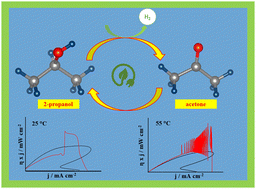The oscillatory electro-oxidation of 2-propanol on platinum: the effect of temperature and addition of methanol†
Abstract
The oscillatory electro-oxidation of 2-propanol on platinum and platinum-based catalysts has attracted growing attention in recent years due to its importance in the interconversion between chemical and electrical energies. This reaction might proceed with a very high selectivity to acetone, nearly without the formation of carbon dioxide, and the reversibility of the 2-propanol/acetone pair is very appropriate for hydrogen transfer. An important aspect of this system is the ubiquitous emergence of potential oscillations under current control, and it has been pointed out as a problem to be avoided and a primary cause of limitations to the use of 2-propanol in practical devices. Herein, we present an experimental study of the electrochemical instabilities in the electro-oxidation of 2-propanol on platinum. The system was studied using polycrystalline platinum, in acidic media and at different temperatures. Besides the extensive characterization of the potential oscillations, we have also discussed possible venues for engineering the dynamics to benefit from the potential oscillations. In this sense, we have also characterized the instabilities in the system containing a mixture of 2-propanol and methanol. The efficiency of a hypothetical fuel cell operated under different conditions is also presented.

- This article is part of the themed collection: Celebrating the scientific accomplishments of RSC Fellows


 Please wait while we load your content...
Please wait while we load your content...